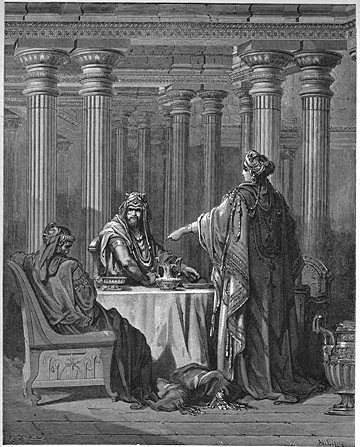Esther 7
1 So the king and Haman came in, to banquet with Esther the queen.
Intravit itaque rex et Aman, ut biberent cum regina.
2 Then said the king unto Esther, on the second day also, during the banquet of wine, What is thy petition, Queen Esther, that it may be granted thee? and what is thy request—unto the half of the kingdom—that it may be performed?
Dixitque ei rex etiam secunda die, postquam vino incaluerat: Quæ est petitio tua, Esther, ut detur tibi? et quid vis fieri? etiam si dimidiam partem regni mei petieris, impetrabis.
3 Then answered Esther the queen, and said, If I have found favour in thine eyes, O king, and if, unto the king, it seem good, let my life be granted me, as my petition, and my people, as my request;
Ad quem illa respondit: Si inveni gratiam in oculis tuis o rex, et si tibi placet, dona mihi animam meam pro qua rogo, et populum meum pro quo obsecro.
4 For we are sold, I and my people, to be destroyed, to be slain and to be caused to perish. If indeed, for bondmen and for bondwomen, we had been sold, I had held my peace, although the adversary could not have made good the damage to the king.
Traditi enim sumus ego et populus meus, ut conteramur, jugulemur, et pereamus. Atque utinam in servos et famulas venderemur: esset tolerabile malum, et gemens tacerem: nunc autem hostis noster est, cujus crudelitas redundat in regem.
5 Then spake King Ahasuerus, and said unto Esther the queen, —Who is he now, and where is he, whose heart is set to act thus?
Respondensque rex Assuerus, ait: Quis est iste, et cujus potentiæ, ut hæc audeat facere?
6 And Esther said, A man who is an adversary and enemy, this wicked Haman. And, Haman, was terrified, before the king and the queen.
Dixitque Esther: Hostis et inimicus noster pessimus iste est Aman. Quod ille audiens, illico obstupuit, vultum regis ac reginæ ferre non sustinens.
7 Now, the king, arising in his wrath from the banquet of wine, and going into the palace garden, Haman, stood to make request for his life from Esther the queen, for he saw that ruin, was determined against him, by the king.
Rex autem iratus surrexit, et de loco convivii intravit in hortum arboribus consitum. Aman quoque surrexit ut rogaret Esther reginam pro anima sua: intellexit enim a rege sibi paratum malum.
8 When, the king, returned out of the palace garden into the place of the banquet of wine, Haman, was lying prostrate upon the couch whereon Esther was. Then said the king, Will he, even dare to force the queen, while I am in the house? No sooner had the word gone forth out of the mouth of the king, than, the face of Haman, they had covered.
Qui cum reversus esset de horto nemoribus consito, et intrasset convivii locum, reperit Aman super lectulum corruisse in quo jacebat Esther, et ait: Etiam reginam vult opprimere, me præsente, in domo mea. Necdum verbum de ore regis exierat, et statim operuerunt faciem ejus.
9 Then said Harbonah—one of the eunuchs before the king—Yea lo! the gallows that Haman made ready for Mordecai, who had spoken well for the king, is standing in Haman’s house, of a height of fifty cubits. Then said the king, Hang him thereon.
Dixitque Harbona, unus de eunuchis, qui stabant in ministerio regis: En lignum quod paraverat Mardochæo, qui locutus est pro rege, stat in domo Aman, habens altitudinis quinquaginta cubitos. Cui dixit rex: Appendite eum in eo.
10 So they hanged Haman on the gallows which he had prepared for Mordecai, —and, the wrath of the king, was appeased.
Suspensus est itaque Aman in patibulo quod paraverat Mardochæo: et regis ira quievit.





















